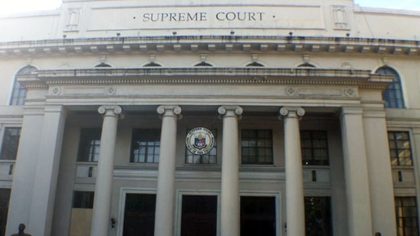SUMMARY
This is AI generated summarization, which may have errors. For context, always refer to the full article.

MANILA, Philippines – Invoking judicial privilege, the Supreme Court has ruled that justices and court employees may not appear before the impeachment trial of Chief Justice Renato Corona.
The high tribunal, in a resolution issued on Tuesday, February 14, said that magistrates and employees are “duty-bound to observe the privileged communication and confidentiality rules if the integrity of the administration of justice were to be preserved.”
The Senate has already denied the prosecution’s request to subpoena SC Associate Justices Lourdes Sereno, Presbitero Velasco, Martin Villarama and Bienvenido Reyes. The SC ruling however makes this part of legal jurisprudence.
The prosecution wanted the 4 justices to appear in the impeachment trial to shed light on Corona’s participation in the deliberations over the recall of a September 2011 decision. In that verdict, the SC ruled with finality that the Philippine Airlines should reinstate some 1,400 employees retrenched in 1998.
The SC, in its resolution, stressed the need to observe confidentiality to fulfill their mandate, saying they have judicial privilege, the “equivalent” of executive privilege which allows members of the executive branch to keep some information from the public.
The High Tribunal said that justices could only testify if they discuss matters not directly related to their functions. An example of this would be if they would be asked about a bribery case involving another justice.
Internal discussions on cases could not be disclosed even in an impeachment court, the ruling said.
Specific instances
The SC ruled that justices and employees are not allowed to disclose information that cover the following:
a. Raffle of cases – This pertains to information on who would be handling a particular case;
b. Court deliberations – The SC quoted part of the opinion of Justice Roberto Abad in a 2011 decision of the SC, which stressed that keeping court deliberations confidential allow magistrates to “freely discuss the issues without fear of criticism for holding unpopular positions” or fear of humiliation for one’s comments;
c. Court records that contain information on court deliberations – These include notes, drafts, research papers, internal discussions, internal memoranda, records of internal deliberations;
d. Confidential information obtained by justices “in relation to their official functions;”
e. Records of pending cases;
As a result of the ruling, these documents could also not be handed over to the impeachment court.
The prosecution requested for court records related to the following cases:
a. The labor case involving the Flight Attendants and Stewards Association of the Philippines (FASAP) and PAL. This part of Article 3 of the impeachment complaint. FASAP said Corona, who inhibited from the case, participated in the deliberations on the October 2011 ruling, when the SC decided to re-open a case already decided with finality. The re-opening of the case was done after PAL legal counsel Estelito Mendoza wrote the SC 4 times.
b. The issuance of a status quo order stopping the House committee of justice from proceeding with the impeachment of then Ombudsman Merceditas Gutierrez (Article 4 of the impeachment complaint). Sereno said in her dissenting opinion that the Court ruled on Gutierrez’s petition even if it had not yet been circulated among all justices.
c. Cases where the SC flip-flopped (these include rulings on the constitutionality of the creation of Dinagat province and the conversion of 16 municipalities into cities). This is part of Article 5 of the impeachment complaint.
The prosecution wanted to request the rollo – which has all the documents related to the case – on these legal disputes.
But the SC said that it could only issue certified true copies of the decisions, orders and resolutions and, in relation to the FASAP case, the letters of PAL lawyer Mendoza.
The Court said that even if some of the cases have already been resolved, the rollo contains records that are still confidential in nature.
The SC also stressed that even if the Senate acts as an impeachment court, the system of checks and balances must still be observed along with “inter-departmental courtesy.”
Inter-departmental courtesy, the SC said, requires that departments be exempt “from the compulsory processes” of other departments. – Rappler.com
Add a comment
How does this make you feel?
There are no comments yet. Add your comment to start the conversation.